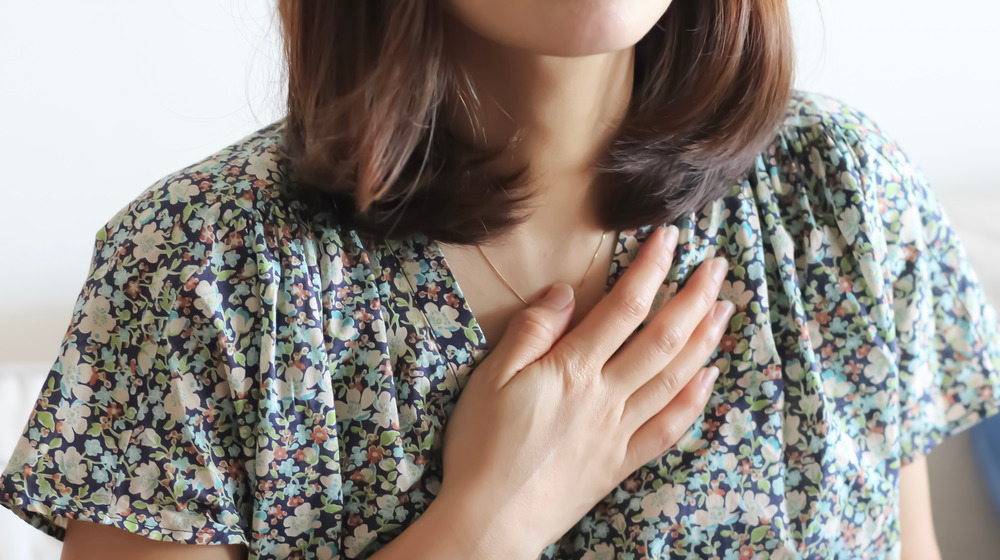Here's What Really Causes Heart Palpitations
Having heart palpitations can be frightening to most people. The cause of the heartbeat abnormalities is often associated with caffeine, stress, or anxiety attacks — which are often difficult to manage. Other medical conditions may also cause palpitations, especially for people who have a history of heart problems. Heart palpitations are even scarier for the elderly, as their health is already delicate. Experiencing the symptoms is definitely not fun, but experts advise people not to worry about them too much.
"Believing that something could be wrong with your heart is a scary feeling. Heart palpitations can make you fear the worst, but palpitations are actually quite common and usually nothing to worry about," Dr. Andrea Tordini, a clinical cardiac electrophysiologist, wrote for the Florida Medical Clinic. "However, that's not to say that you should ignore them completely," she added. "Rarely, they could be a sign of a more serious condition like AFib." She also notes that knowing the bad symptoms "can help you catch certain conditions early so that you can seek treatment."
Sometimes, heart palpitations can cause sensations through the neck or throat, and they can even happen when at rest. If you experience heart palpitations that last longer than a few seconds, and if the sensation is accompanied by shortness of breath, dizziness, or chest pain — it is best to consult your doctor right away (via Main Line Health). Remember, health is wealth. Do not hesitate to seek help.
Can coffee really cause heart palpitations?
Caffeine often comes to mind when you think of heart palpitations, especially when one consumes too much of it. However, each individual has different caffeine sensitivity levels (via the Mayo Clinic). A person may drink two to three cups of coffee a day as part of their daily routine and may feel completely fine. Meanwhile, for people who are not avid coffee drinkers — a cup can feel overwhelming. Not all individuals run on caffeine, but for some who do, coffee can be a drink that they can't go a day without as it increases their performance (via iFit).
For people who can't handle too much caffeine, drinking more than a cup of coffee can cause side effects that can really feel uncomfortable, such as nausea, feeling of anxiousness, headaches, and heart palpitations (via Healthline). High caffeine intake can also cause a person to sleep less. Not having enough rest at night can also lead to irregular heartbeats, as well as having coffee first thing in the morning. According to the Sleep Foundation, insufficient sleep can cause heart problems, which can trigger heart attacks and heighten the risk of diabetes and stroke.
Too much alcohol and chocolate can cause heart palpitations
According to a study from the European Heart Journal, consuming too much alcohol can cause heart palpitations and even cardiac arrhythmias. Experts conducted a study (with 3,028 voluntary participants) during the 2015 Munich Oktoberfest, where thousands of people gathered to consume beer. For individuals who rarely drink alcohol, consuming too much of the beverage can cause them to experience some fluttering in the chest, as per Healthline. Caffeinated refreshments like teas, energy drinks, and some types of soda can also trigger palpitations, the outlet notes.
Chocolates, meanwhile, may be delicious, but eating in moderation is beneficial to your blood sugar levels and your heart health. The sweet food contains theobromine, which can improve a person's mood. However, just like coffee, high consumption of chocolate can increase one's heart rate, leading to heart palpitations (via Livestrong). As for chocolate's caffeine content, the higher the cocoa solids in the chocolate, the higher the caffeine (via the San Francisco Chronicle). According to the USDA, dark chocolate with 60-69 percent cocoa solids has 24 milligrams of caffeine, while chocolate candies with 45-59 percent cocoa solids has about 13.
This said, dark chocolates are not bad for health. In fact, the dark variant is filled with antioxidants and is known to have various benefits to the body, such as improving mood and blood circulation and lowering bad cholesterol (via Livestrong). Again, eating in moderation is key.


